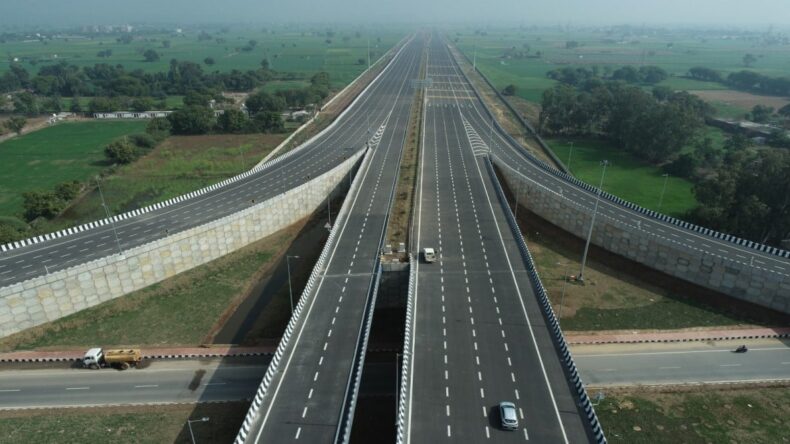Table of Contents
Prime Minister Narendra Modi today launched the first segment of the 1,400-kilometer-long Delhi-Mumbai Expressway in Dausa, Rajasthan, and set the groundwork for road construction projects costing over Rs 18,100 crore. The 246-kilometre highway portion between Delhi and Dassa-Lalsot would take around three and a half hours to go from Delhi to Jaipur.
PM Modi commemorated the opening of the Delhi-Mumbai Expressway by pressing a remote control button. “Our national slogan is Sabka Saath Sabka Vikas; in keeping with that, we are developing “Samarth Bharat,” and the highway is a fantastic reflection of India’s growth, we say.”
The Sohna-Dausa section of the Delhi-Mumbai Expressway, which spans over 246 kilometres and was constructed at a cost of over 12,150 crores, will reduce the current travel time between the two major cities from 5 hours to just 3 hours, relieve traffic on the Delhi-Jaipur NH 48 highway, and significantly boost the economic growth of the entire region. The Delhi-Mumbai Expressway will be the country’s longest highway with a length of 1,386 kilometres.

“Investment on infrastructure attracts more investment.”: PM Modi
When speaking to a crowd of people in the eastern Rajasthan village of Dausa’s Dhanawar, the prime minister claimed that research shows infrastructure investment attracts further investment.
PM Modi claims that when the government funds infrastructure projects like highways, ports, railways, optical fibre, and healthcare facilities, it promotes sectors like small manufacturers and retailers.
The PM also mentioned that rural “haats” are being established along the motorway so that local artisans may sell their crafts. The PM said that those who go to Delhi for business are now able to go home in the evening after ending their work.
He claims that the construction of the Delhi-Mumbai Expressway will benefit national parks like Sariska, Keoladeo, and Ranthambore as well as towns like Jaipur and Ajmer. The new infrastructure project, in the prime minister’s opinion, would only help to increase Rajasthan’s appeal because the state is already well renowned for its tourism industry.
People like Union Minister for Road Transport and Highways Nitin Gadkari, Union Minister for State V K Singh, and Union Minister Gajendra Singh were present on stage during the opening ceremony for the Delhi-Mumbai Expressway.
During the programme, Manohar Lal Khattar, the chief minister of Haryana, and Ashok Gehlot, the chief minister of Rajasthan, both delivered addresses through video link.
Mr Gehlot attended the ceremony from the Jaipur residence of the Chief Minister, while Mr Khattar gave the address at a gathering in the Nuh area.
The Delhi-Mumbai Expressway
The nation’s longest motorway was opened to the public for the first time just before a crucial election year. It is anticipated that the spectacular road would shorten the travel time between Mumbai, the nation’s financial hub, and the capital of the country, in half, to only 12 hours.
With eight lanes wide and over 1,400 kilometres in length, the whole Delhi-Mumbai Expressway project is being built at an astronomical price of over one lakh crore rupees. Up to 12 lanes can be added to it.
From Gujarat to Maharashtra, five significant Indian states will be connected by the enormous project, which is hailed as an engineering marvel.
It is the first motorway in Asia to provide animal overpasses and wildlife crossings as well as side amenities including helipads, emergency centres, charging stations for electric cars, and designated lanes for electric cars.
It also has SOS stations every two kilometres where individuals can go for assistance in the event of an accident or other emergency.
With the opening of the Sohna-Dausa section, the massive motorway will be connected to Alwar and Dausa in Rajasthan as well as Gurugram, Sohna, Nooh, and Mewat in Haryana.
The Delhi-Dausa route features eight entrance and exit points.
With a top speed of 120 kmph for all vehicles, the route can reduce fuel consumption by up to 300 million litres and CO2 emissions by 800 million kg yearly.
Automatic toll booths are installed throughout the whole roadway, and the toll fee is only ever deducted once. It is calculated from the time one enters the highway till the time one exits it. The toll for the 220-kilometre drive between Delhi and Jaipur is 70 rupees or 35 cents per kilometre.













